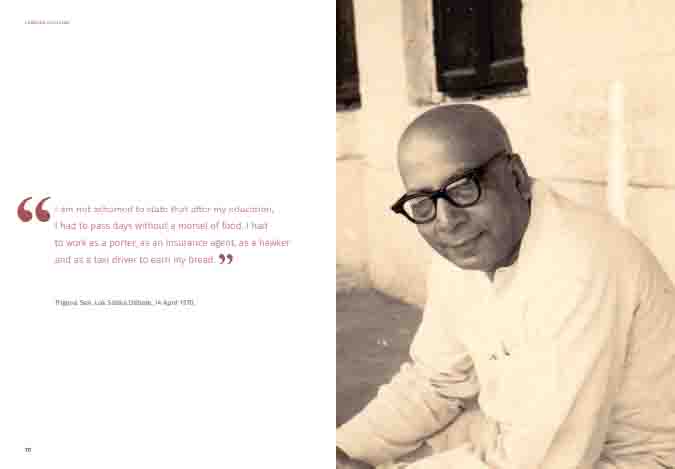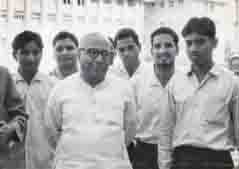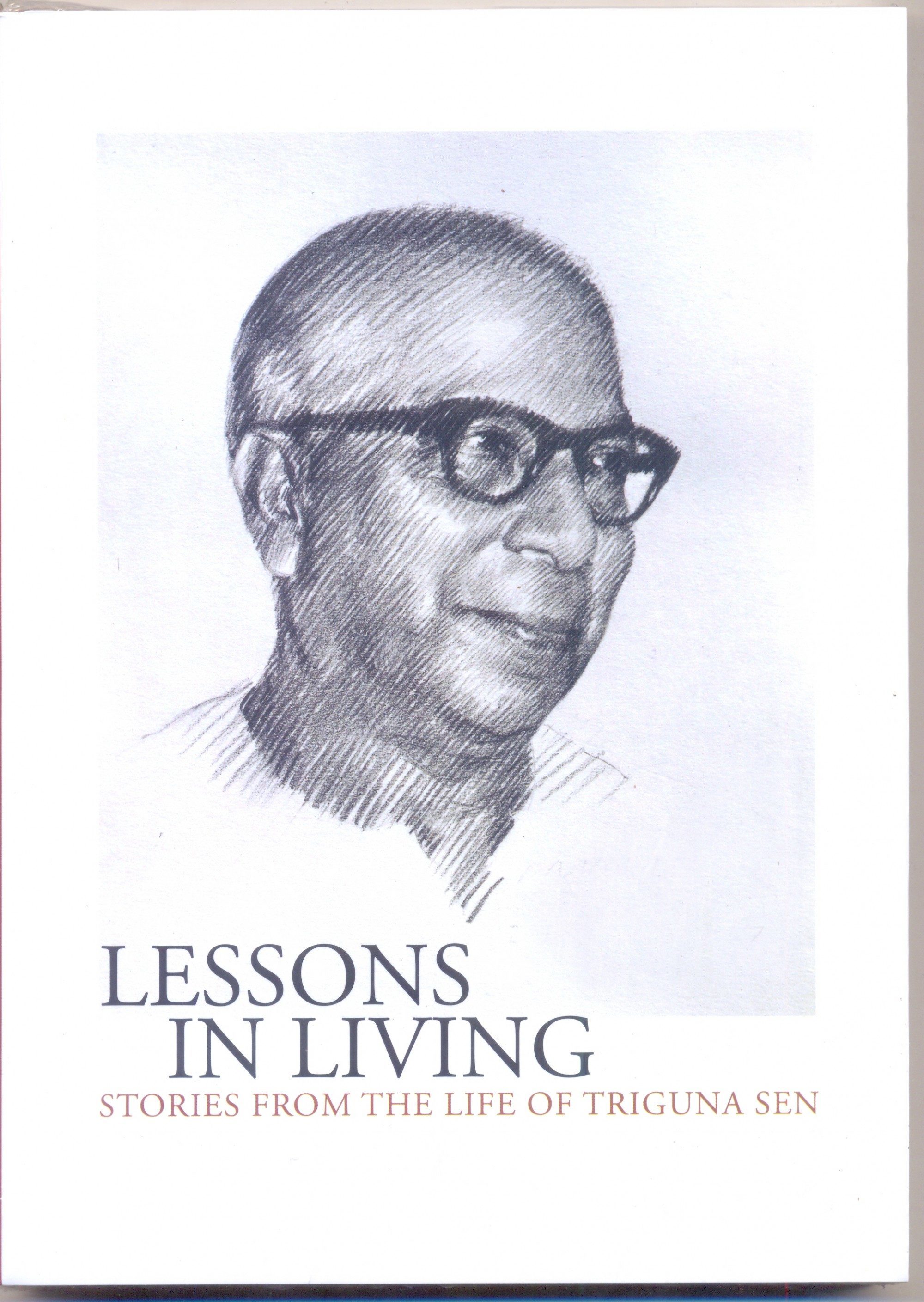Dr. Triguna Sen had his finger on the pulse of student life and understood their fears, joys, anxieties and desires
Triguna Sen, formerly Principal of CET [College of Engineering and Technology], was appointed Rector of Jadavpur University from 17 January 1956 and remained in that position until 1964. The designation of Rector changed that year to Vice Chancellor and Dr. Sen became the first Vice Chancellor of Jadavpur University. Dr. Triguna Sen insisted that the university had to focus on developing its Arts and Science Faculties. The Arts Faculty had English, Economics, Bengali, History, Philosophy and Sanskrit and introduced two new subjects – Comparative Literature and International Relations. Dr. Prithwis Chandra Chakravarti was invited to begin the International Relations Department while the noted Bengali poet, writer and editor Buddhadeb Bosu was invited to begin the Comparative Literature Department. Other eminent poets such as Sudhindranatha Datta and Ajit Dutta also joined him. The new university invited the eminent historian, Susobhan Sarkar, the scholar of English, Subodh Chandra Sengupta and S.K. Das to join. Jadavpur also had the singular distinction of appointing the twenty-five year old Amartya Sen as the first Head of the Department of Economics in 1956. The appointment of one so young as Head of the Department was unheard of and shocking but Dr. Sen as Rector stood by his decision. A little more than four decades later, Amartya Sen would be awarded the Nobel Prize. The Faculty of Science with departments of physics, chemistry and mathematics began in 1956 and was among the first to include the geological sciences. The new university thus began with the pioneering vision of initiating new subjects that were not taught in traditional universities and appointing some of the best teachers to teach them.

But it was the spirit of the National Council of Education that had an enduring influence on the way technical education evolved at Jadavpur University. Mechanical Engineering, which was Dr. Sen’s subject, was among the oldest departments but modernised rapidly using the expertise of its teaching faculty to engage in government projects for Defence Research and Development Organisation, the Bhaba Atomic Energy Centre and the Vikram Sarabhai Space Centre among others. Ever mindful of the significance of nurturing a partnership between institution and industry, Dr. Sen took the lead in initiating a joint research programme between the Hard Metal Company and the Department of Geological Sciences of the University. Chemical Engineering, one of the pioneering departments continued to flourish, while Civil Engineering and Electronics and Telecommunications Engineering were established in 1956 and 1957 respectively.
All these led to the Department of Computer Science and Engineering being commissioned to design and build one of India’s first electronic, digital computers, the ISIJU-1 in collaboration with the Indian Statistical Institute in 1966. From 1968, this pioneering department began to offer a postgraduate diploma course in computer Science. The 1960s saw other new departments being built – the Department of Pharmaceutical Technology under the guidance of Professor M.L. Shroff from BHU and the Department of Food Technology. The Departments of Metallurgical Engineering, and Architecture were established in 1965. The University also introduced a part-time evening programme through which Engineering Diploma holders could study for an engineering degree and teachers employed in schools and colleges could procure their Masters in the Arts or the Sciences.
The cooperation of the three academic streams required the creation of a supportive atmosphere within the university. Along with Professor Gopal Chandra Sen, who was appointed the first Provost of Jadavpur University, Dr. Triguna Sen ensured a collaborative culture and instilled a spirit of sharing among his young colleagues. He made himself available to students and teachers at all times. He also instituted a few traditions that enhanced the culture of collegiality and cooperation: he organised an Annual Dinner for freshers who were introduced to each other and to their teachers in an informal manner. He actively promoted a culture of debate and encouraged students to participate in inter-university sports and other cultural festivals. Jadavpur successfully participated in some of the earliest inter-varsity youth festivals organised in the country. Apart from that, life on campus was enriched by visitors who would come there invited by Dr. Sen, drawn by the energy of the new university. In 1958, the Vietnamese Communist revolutionary leader, Ho Chi Minh, visited Calcutta at the invitation of Dr. Sen. The following year, Martin Luther King who had come to India, as he said as a “pilgrim” and found in India “the strongest bond of fraternity”, visited Jadavpur University. The speech of the Civil Rights Leader had an emotional appeal to the students of Jadavpur University. And by the Library stairs, they heard Coretta Scott King first hum and then sing, “We shall overcome”. It was a moving moment that remained seared in memory of students who were there. The visits of the Nobel Laureates Niels Bohr and Linus Pauling in the 1960s were no less inspiring. Such visits, during which students and faculty interacted with world leaders and scientists, placed the students and teachers within a culture that was international and ensured their exposure to questions that were part of the larger world as a whole. This manner of opening of a window to the world, made the atmosphere inclusive and open. In the same spirit, Dr. Sen also encouraged numerous visits by World University Service students from different universities in the USA.

Even as students had to be provided with the best facilities and cultural exposure, they were also nurtured so they gained confidence to face any situation. The university, Dr Sen believed, had to be nurturing place that shaped the personalities of students and fostered a sense of creative confidence. Dr. Triguna Sen had his finger on the pulse of student life and understood their fears, their joys, their anxieties and their desires. It was this deep understanding of human nature that enabled him to feel what they felt and understand the world as they saw it. He was often seen roaming around the campus, watching students as they played a game of football, stopping to talk to a student sitting by himself, empathising with a student who was grieving. Although teachers’ salaries were low at the time, Dr. Sen had a reputation for helping anyone who was in need. He encouraged cultural events such as plays – sometimes participating in them himself. Such interactions marked him out as an unusual leader. Dr. Sen was possibly the only Vice Chancellor who did not employ a driver but drove his own car, a Vauxhall Velox, often times offering to drop his colleagues to their destinations. On campus, he kept an open house where students, teachers and staff (no matter what their rank) were always welcome.
Dr. Sen trusted students and never thought student agitations required external intervention of any kind – there was nothing that could not be solved through dialogue and discussion. His response to crisis on campus was always calm. He met with students, advised them when they were confused and encouraged them to play a larger role in the society around them. For him education had to be integrated with social and political responsibilities.
Triguna Sen remained a key figure who embodied the idea of Jadavpur. Having studied, taught and led the different manifestations of the technical and engineering institutions set up by the NCE, Dr. Sen nurtured the idea of the “Jadavpurian” – so students and the alumni would not only identify with the institution long after they had graduated and left the campus, but would also support the university and each other. It was this sense of strong identification that had created and sustained the Alumni Association of NCE and Jadavpur University.
Excerpted with permission from Lessons In Living: Stories From The Life Of Triguna Sen, published by The National Council Of Education (NCE), Bengal. The NCE was founded by Indian nationalists in Bengal in 1906 to promote science and technology as part of a swadeshi industrialisation movement. It established the Bengal National College and Bengal Institute which would later merge to form Jadavpur University.
[All photographs from the book]
Price: Rs 600.

